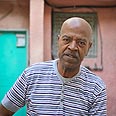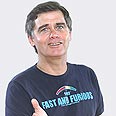


Religious or bubbly? Dirty or charming? Racist or pluralistic? In honor of Jerusalem Day, we spoke with a few Jerusalemites, or natives of the capital, on why they abandoned the city, or why they chose to stay. Who is addicted to the sesame pretzel at the Jaffa Gate, who gets nauseous when ascending the windy roads leading to the city, and who has conversations with the stones in the Old City.
Politician isn't homesick
Former Knesset Speaker Avraham Burg was born in Jerusalem in 1955 and left it 28 years later. "First of all, I don't like cities in general. Urban reality doesn't suit me, I like the village. But from all the cities – Jerusalem is the one I miss the least.
The former Knesset Speaker makes his way up to the capital once a week, to join the weekly leftist protests in Sheikh Jarrah.
"How can you think in an emotional or positive-nostalgic way about a city that when making your way to it, you have a traffic jam; then the next three kilometers are paved with cemeteries; then the Lubavitcher Rebbe waives at you, and after you've managed to survive him as well – dozens of beggars and men from religious institutions trample you. The first five kilometers at the entrance to the city try to estrange me, but they cannot contain me," he adds.
"A capital should aspire to represent the human fabric of the entire country, but most of the Israeli society is not Messianic, redemptive or nationalistic, and also isn't Arab
"Jerusalem's main advantage is its ability to produce spirituality and not necessarily work places. Spirituality doesn't mean religiosity and zeal, but many experiences," Burg explains.
Terrorist crazy for city
In 1968 Ali Jeddah planted four hand grenades on Strauss Street in Jerusalem. Nine Israelis were injured in the explosion. He was released from the Israeli prison as part of the Jibril prisoner exchange agreement in 1985.
"Those who were injured were victims of the occupation, just as I was," says Jeddah, 60, who lives in what he calls "the African quarters" of the Old City of Jerusalem. In his spare time, Jeddah conducts voluntary tours of the Old City, and also travels the world, giving lectures about the Israeli-Palestinian conflict.
The former prisoner says he was born in Jerusalem, where he will also end his life. "What is Jerusalem without Arabs? It's like taking the heart out of a body. I was all across Europe; I was invited to give lectures in the most beautiful places. Once I told them: 'Listen, I won't trade your entire continent for a single corner of the Old City.' I am crazy about this city; I have become an integral part of it.
"Sometimes," Jeddah recalls, "I stroll around alone at night, and have conversations with the stones of the Old City. I treat Jerusalem like my girlfriend, I make love to it all the time," he says.
"I love the simplicity of Jerusalemites, and its many shades. To see church bells on the one hand, a muezzin on the other, and also Orthodox Jews running toward the Wailing Wall. It’s a pleasure – people come to pray, not to provoke."
Since his release, Jeddah has devoted his life to fight "against the occupation," in peaceful ways. "My dream is to see my children work as pilots or engineers – so that they don't go through the same experience I did. My mission in Jerusalem is to raise the new generation on values of love and hope of a better life," he says.
Author: Messed up city without center
Playwright and children's' author Ephraim Sidon moved to Jerusalem in 1970 to study in the Hebrew University. He lived in the city for 34 years and then moved back to the center of the country.
"At the beginning it was excellent; In the 1970s and 1980s the city was splendid, full of openness, a lively night life and vitality. The students were here, the media was here, but slowly they all started to disappear," Sidon laments.
According to the author, the decline began with the opening of the Mount Scopus chapter of the university. "As soon as they started exiling students to Siberia –the city was finished," he claims.
"Nowadays, the city and state's leaders talk as if they were profits, using terms such as 'for ever and ever' and 'eternity,' but do nothing about it. It is currently the poorest city in the country; a third of its population are Arabs who do not recognize it, and a another third is haredi who are not concerned with the authorities.
"Two thirds of the city is anti-Zionists, while the third that is Zionist pays city taxes and supports all the others who don't pay. Thirty years from now the city will be Arab and haredi, like the rest of the country – only sooner," says Sidon.
"These days, Jerusalem does not have a city center. Jaffa Street is excavated like the Blaumilch Canal, and the streets look like the bazaars in Tel Aviv's central bus station; it's the most dirty and poor city in the country, with no jobs and a cultural budget that equals about 4% of that of Tel Aviv's.
"The neighborhoods are also drawing away from the center – it's a messed up city that has neighborhoods from Gilo all the way to Mount Scopus. On the one hand it's the most mixed city in the world, and on the other it is incredibly racist. It's not by chance that Beitar Jerusalem F.C. (Jerusalem's football club) is the most racist team in the country, and they don't even deny it. So why live there?" Sidon concludes.
Journalist: Amusing and annoying
"Jerusalem enriches me, preoccupies me, annoys me, amuses me and is also frustrating at times. It opens my heart, and then shuts it – it does everything but bore me," says media personality Jacky Levy, who was born in Bat Yam and moved to Jerusalem only as a student at the age of 27. "I see myself as an exiled Jerusalemite. My family is from here, and I was raised on stories of the city from a young age," says Levy.
"I love the food in Jerusalem. I can enjoy the little and simple things like a sesame pretzel in Jaffa Gate, a good meal at the marketplace, or goose liver and kugel in Mea Shearim. In terms of restaurants, Jerusalem puts up a fight against Tel Aviv," he says.
"The Jerusalem humor is like a flower coming out of a rock. There are people with sealed faces, who you won't believe can entertain, until they open their mouths and you laugh.
"Jerusalem is the right place for those who like love stories with a high drag coefficient," says the media man, while also addressing the city's difficulties. "Let a street look like a street, and a construction job take a month and not five years.
Let things like Holyland not happen, and garbage bins should not be torched every Mondays and Thursdays. All these emotional outbursts are annoying. But in principle I need Jerusalem, and love it; I cannot say it is a straightforward love."















